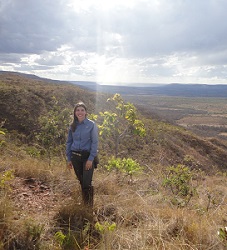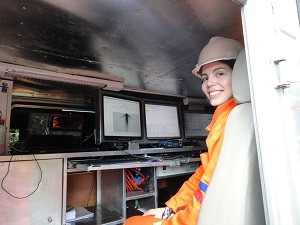Dr Aline Melo, Lecturer/Assistant Professor and Ad Astra Fellow

What is your research about?
My expertise is in 3D modelling of the Earth using geophysical data, and integrated quantitative interpretation of multi-physics data for understanding geology at depth. When we do 3D modelling and we are dealing with one or two physical properties (such as conductivity, density, velocity, magnetic susceptibility), our brains can look for patterns to process this information, but when we are dealing with three or more physical properties, it's no longer easy to do this manually. That's why we turn to machine learning to extract information from large datasets. This allows us to transform data into knowledge and empower our decisions as geologists.
What does a typical week look like for you?
In a given week, I spend time modelling, talking to different people, and also teaching. I have a lot of meetings with geologists, trying to understand various geological challenges. Having understood the problem, I might take some time on my own, trying to think of the right tools to apply and what data is available, whether it be from the government or from companies. I also consider different scales, thinking about how we can go from regional to prospect scale, and how the techniques might change as we want to examine data in detail. One thing I do is work with synthetic geology, which is a bit like a made-up geological world where I can include all the challenges I want to investigate. It's a bit like a video game such as Minecraft, where you build your own world. I can build my own geological world and assign different physical properties to it and test different scenarios. I do this to build concepts and gain knowledge that can be applied to the real-world. I also spend time preparing lectures and teaching, which is fun.
What led you to specialise in geology and geophysics?
In university, I was always attracted to geology and my degree was in geology, but I really liked the quantitative world, so I took extra classes in maths and physics. I took masters level applied geophysics classes as well. And then I started building my way into the geophysics world, through an undergrad research project in geophysics and an internship in a geophysics company. After graduation, I worked for five years for a mining company, Vale, and because of my previous experience with geophysics, the manager assigned me to the geophysics team. It was great because I could do a lot of practical work in geophysics, but at some point I felt I didn't have a full understanding of why I was doing things in terms of the theory behind it. That's why I decided to do a PhD in geophysics. At the beginning it was very hard because I was used to seeing rocks, but now I needed equations and programming skills. So it was very challenging, but now I feel that, after that, I can wear both hats, and talk to both sides effectively, trying to communicate quantitative aspects to geologists and trying to communicate geological concepts to geophysicists.

What's your favorite aspect of your work at the boundary of geology and geophysics?
[It is] when the research team and I present the results of our work, namely integrated models with all the interpretation of all the possibilities that can help solve a geological problem. Then geologists’ eyes start to shine and this makes all the years of hard work worth it! Getting feedback from colleagues that my work can actually solve a real-world problem is the favourite part of my job. For example, in underground mining, geophysics can help better planning to diminish the footprint on nature and impact on communities. In order to have a very small footprint on the surrounding area, we need to know what's happening underground, where the ore bodies are, the tonnage size, and so on. Of course, this requires months of training, but we need geophysics to connect the dots.
Do you have any advice for students thinking about studying geology?
There are so many things you can do with geology. For example, if you like chemistry, you can go into geochemistry; if you like physics, you can go into geophysics. Thinking of the quantitative side of geology, the Earth is the most complex system that you can ever attempt to understand. Understanding the Earth quantitatively is the best challenge, the best adventure, you can embark upon. It's a very challenging, but very satisfying process, because you look at the world with totally different eyes when you understand its geology.